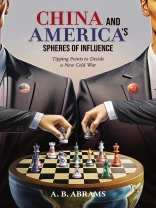A B Abrams’ book is the first to specifically focus on the global conflict for influence between China and the United States and offers groundbreaking insights into the factors that will determine the outcome of their new cold war, and the radically different advantages both sides have.
The ability to exercise influence across continents through trade and empire has played an increasingly central role in determining great powers’ geopolitical standings since the onset of the colonial era. In both the World Wars and in the Cold War, ensuring that the bulk of the global economy contributed to the war efforts of the established powers, while isolating the rising powers that challenged them, was key to determining the conflicts’ outcomes. China and America’s Spheres of Influence places the current multi-faceted contest for global influence in historical context, highlighting how and to what ends both countries have been able to leverage different kinds of influence — whether sway over oil producing countries, a larger global military footprint, or control over key financial institutions.
This book divides an assessment of the global Sino-American contest for influence in to eight chapters respectively focused on: international trade, reserve currency status, and sanctions; defence, military footprints and arms markets; international organisations from the UN and IMF to BRICS and RCEP; Western policies to influence former colonies and neutral states; the struggle for influence in Africa; competing influences over the Arab Gulf States, oil markets and global Islam; the contest for influence through high tech, from the struggle over Huawei to bifurcation; and finally, the contest for influence over Russia and the implications of war in Ukraine for global alignments.
Contents:
- About the Author
- Abbreviations
- Introduction: Empire, World Order and the Chinese Challenge to Western Power
- International Trade: The Geopolitics of Commerce, Currency and Economic Warfare
- Defence: Arms Trade, Expeditionary Warfare and the Shaping of Global Military Balances
- International Organisations as Tools for Global Influence
- Establishing Neo-Colonies and Combating Neutrality: External Shaping of States’ Alignment
- Africa: European Hegemony and its Emerging Challengers
- The Gulf States: Oil, Security and Global Islam
- Influence Through Technology: Huawei, Bifurcation and the High Tech ‘Swing States’
- Russia, the Ukraine War and Geopolitical Realignment
- Index
Readership: A good reader for students of International Relations, Geopolitics, China and Asia Studies, and International Security. General readers and enthusiasts of International Relations.
Key Features:
- Analysis from an international perspective with broad historical, geopolitical and technological context
- Methodological analysis of all events in the context of their broader geopolitical significance












